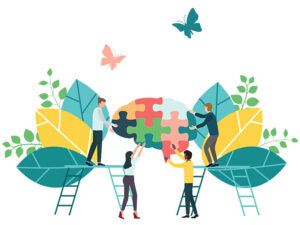From navigating newfound “independence” to finding friends in a 500 person class, transitioning into university life was a struggle for me. Realizing that I was, in fact, not an exception to all those times faculty warned us that “university is much harder than high school,” I found myself constantly questioning my self worth and whether I was capable of seeing this college thing through. My mentor at the time worked at my school’s counseling and mental health service, and suggested that I consider looking into what they have to offer for students like me. After a week of staring at the phone number on the website, I finally worked up the courage to make the call. Somehow overpowering the urge to hang up the phone as soon as the counselor picked up and working up the courage to walk to my appointment, I found myself on a comfy little sofa across from my counselor.
Here, I found myself slowly opening up to him, delving into my University experience and accepting the fact that I was on that sofa because I deserved to talk to someone, not because there was something wrong with me. When he started asking me questions about my culture and religion, I froze. I almost felt the wall that I had painstakingly pieced apart build back up between us. He constantly reassured me that he was asking these questions to see if there was a sense of community I could establish, but I could not shake the fear that he was going to judge me as soon as he realized I was Muslim.
Upon discussion with many of my peers, I learned that many members of the Muslim community resonate with this hesitancy to obtain counseling services. The current state of the media has shaped many negative connotations towards the Muslim community. Thus, many Muslims have to navigate interactions sparked by these negative connotations, adding to the stressors of daily life. This does not indicate the strength of one’s faith or the confidence they have in their religion. However, there are nuances of daily life that members of the Muslim community encounter that contribute to their mental health. Constantly being told or chastised by others for your choices regarding the hijab (whether you wear it, how you wear it, etc.) can be a frustrating experience because it is such a personal part of one’s journey. Waking up to news of a mosque shooting across the world may make one question whether this would spark further violence in their own community: are they no longer safe going about their daily routine? Witnessing a lack of awareness towards Muslim concentration camps may make one question whether the world actually cares about the injustices towards this community. These events constantly take a toll on the well-being of Muslims around the world, so how does a non-Muslim counselor even begin to understand these concerns and how they apply to the already present stressors of life?
At this time, Muslim representation in counseling and mental health services is especially important to provide the best level of support to members of the Muslim community. In general practice, people tend to be more comfortable with counselors/healthcare providers who share some sense of identity with them. In the same way, Muslims may feel more understood by a counselor who understands their beliefs, acknowledges the effects of stigma towards their religion, and can work towards addressing those concerns. This can be implemented through increasing Muslim representation in this field or through establishing trainings on how to address the needs of this community. Hopefully this will encourage more members of the Muslim community to reach out to counseling services, potentially allowing for further Muslim representation in the field and working towards addressing the stigma of using mental health resources.

Illustration by Natee127/Getty Images
Mental Health Resources in Austin for Muslims:
- Sarah Shah, Licensed Professional Counselor-Associate: www.healwithsarahshah.com; IG: @healwithsarahshah
- Rawand Abdelghani, Licensed Social Worker and Mental Health Clinician: IG: @hopewithrawand
- Safa Institute, non-profit organization for connecting muslims with mental health resources: IG: @safainstitute
Featured Image: Photographed by Nadia Correia

Leave a Reply